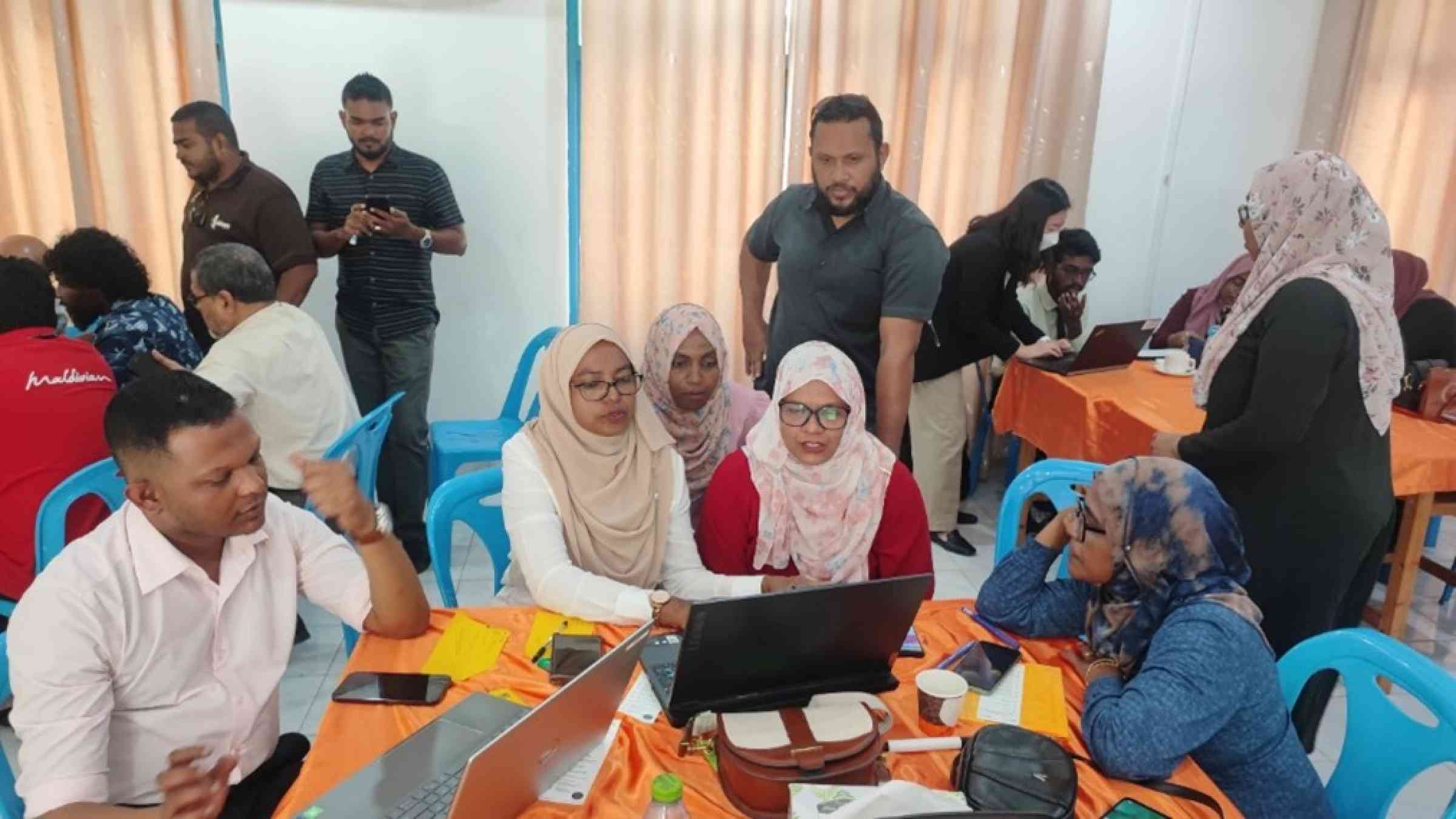Urban resilience gains momentum in Maldives

Known for its mangroves, boat building, and coir rope manufacturing, Kulhudhuffushi was the first city in the Republic of Maldives to join Making Cities Resilient 2030 (MCR2030).
MCR2030 promotes urban resilience to disasters with the aim of building inclusive, safe, resilient and sustainable cities by 2030, contributing to the achievement of the Sustainable Development Goal 11 and other global frameworks, including the Sendai Framework for Disaster Risk Reduction 2015-2030, the Paris Agreement and the New Urban Agenda.
Located 275 kilometers north of the capital Male and affectionately known as “The Heart of the North”, Kulhudhuffushi City has made great strides towards resilience since joining MCR2030, especially considering that it received its city status only two years earlier.
Kulhudhuffushi was fortunate to begin its roadmap to resilience in June 2022 with a multi-stakeholder workshop in its own city – the first MCR2030 workshop ever held in Maldives. During this workshop, local authorities learned how to apply MCR2030 tools to assess the city’s resilience, identify needs and gaps and develop a strategy to build resilience based on the outcomes of the assessments.
'We did not realize we were note prepared ... we see this an opportunity to improve'
In June 2022, Kulhudhuffushi City learned how to use UNDRR's Disaster Resilience Scorecard for Cities. Its assessment found that the city needed to prioritize infrastructure resilience and accelerate disaster recovery and building back better in the event of a disaster. The City Council is taking the lead role in applying the results of the Scorecard for the mid-term review of its 2022-2026 development plan to ensure that disaster risk reduction (DRR) and urban resilience are taken into account.
"We didn't realize we were not prepared”, said the Secretary General of the Kulhudhuffushi City Council, Abdulla Adam. “However, looking at the Scorecard assessment, we realized there is so much work to be done to make our city resilient. If you see our scoring, you would see we have rated quite low in some areas. But we see this as an opportunity to improve, thanks to the scorecard. And we want to work for it."
To gain a better understanding of the city’s risk and coping capacity, the local authorities launched a detailed multi-stakeholder vulnerability and capacity assessment. Meetings were held with various stakeholders to better understand the various roles and responsibilities in DRR and building local resilience. In addition, the city’s annual budget was reviewed to ensure that DRR measures and risk assessments were mainstreamed. The city's commitment to the MCR2030 initiative and urban resilience has paid off. The Disaster Resilience Scorecard for Cities and the other assessments the city has conducted have helped to improve the city's disaster preparedness and resilience. The multi-stakeholder network and supportive community have also been invaluable in shaping the city's DRR strategies and initiatives. Thanks to these efforts, Kulhudhuffushi is now better prepared to face the challenges of disasters.
Local governments inspire others
Kulhudhuffushi City's remarkable progress within months of joining MCR2030 led to the local authorities being invited to present their findings at the 'Disaster Resilience Leaders Forum' in Incheon, Republic of Korea in September 2022 and during the inaugural city-to city training event in Maldives, hosted by UNDRR in March 2023.
This training session, co-organized by the National Disaster Management Authority (NDMA), Local Government Authority (LGA), and UNDRR, took place in Fulvahmulah City, which proudly became the second MCR2030 city in Maldives in early 2023. The event was expertly facilitated by Kulhudhuffushi City Council's Secretary General, Abdulla Adam, and Deputy Mayor, Ali Ahmed, who shared valuable lessons from Kulhudhuffushi City's inspiring journey towards resilience.
'It is very important that we work with everyone to prepare for extreme weather events'
“When you think of Maldives, you think of a peaceful island and people living without fear. But with the changing climate and extreme weather events, we now fear disasters and we ask ourselves how we can prepare and deal with them”, said Ismail Rafeeq, Mayor of Fuvahmulah City. “It is important for the City Council and the residents of Fuvamulah City to have a better response plan and this training helps us to start engaging with different stakeholders. Given the disasters in the past, it is very important that we work with everyone to prepare for future extreme weather events. This will help us to better deal with disasters."
After the three-day training in Fuvahmulah, the preliminary version of the Disaster Resilience Scorecard was used to assess the city’s resilience. Fuvahmulah local authorities are now exploring the development of a DRR plan and its integration in city planning, infrastructure development and improvement; further risk assessments; public awareness raising; capacity building; and enhancing emergency response and recovery.
“It is crucial for us to learn and prepare to respond to disasters caused by climate change. It is better to be prepared and take mitigative measures instead of responding to disasters. Fuvahmulah City is vulnerable and faces numerous hazards such as flooding and fires, even if the national government provides support. The best result can be achieved with the wider support of stakeholders, including at the local level,” said the Deputy Mayor of Fuvahmulah City, Mohamed Fikury.
More local governments in the Maldives are set to follow in the footsteps of Kulhudhuffushi and Fulvahmulah and join MCR2030 and start their roadmap towards urban resilience.